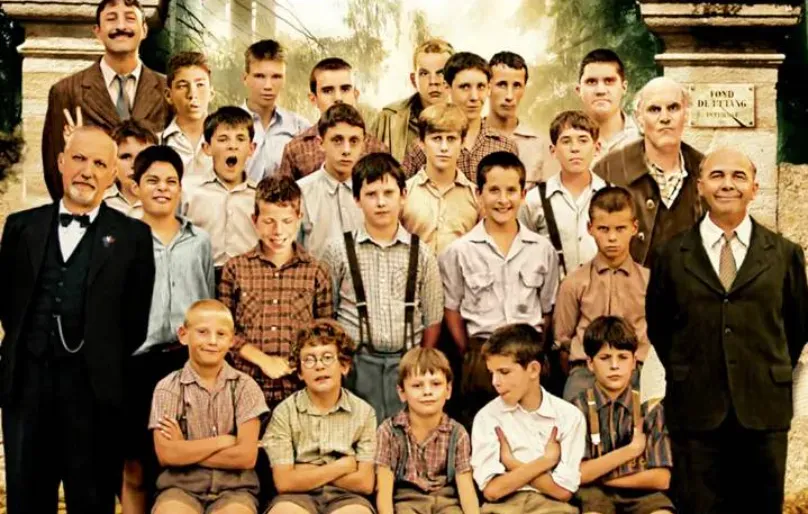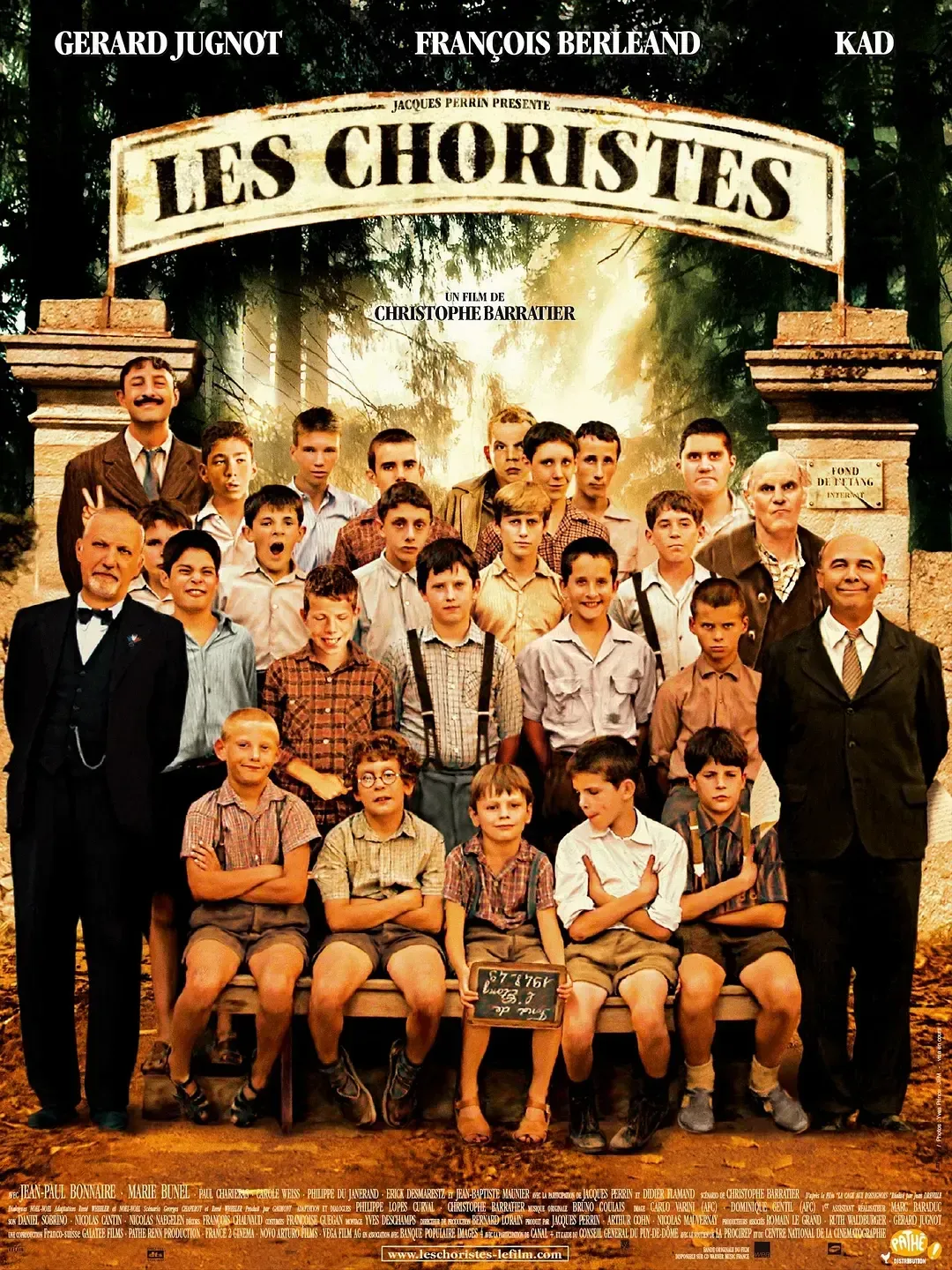

There is a classic movie that cannot be missed. It was born in 2004 and is still famous and internationally renowned until now. Its Rotten Tomatoes received 92% favorable reviews, won the French film’s highest honor, the Caesar Award, and was shortlisted for the Oscar for Best Foreign Language Film. Among the many music-themed films, if I had to pick one, it would be ‘The Chorus’.


Film History Classics
An all-time classic, ‘The Chorus’ has a strong behind-the-scenes team. It was produced by the late Jacques Perrin, a French documentary filmmaker.
He had made a series of classic works such as ‘Microcosmos: Le peuple de l’herbe’ and ‘Le peuple migrateur’, and also acted in ‘Cinema Paradiso’ and ‘Un uomo a metà’, which won the best actor in Venice. On April 22nd this year, Jacques Perrin passed away at the age of 80.
The director, Christophe Barratier, graduated from the Conservatoire Normale de Paris. He is a former classical guitarist and winner of several international music competitions. The film is the director’s feature-length masterpiece, and he has a knack for using music to narrate and tell stories in a dynamic and interesting way.
The lead actor is Gérard Jugnot, who is also one of the producers. He mortgaged his Parisian apartment to make the film.
After its release, the film won the annual box office in France. He was paid 5 million euros, making him the highest paid actor in France at the time.
The story of the film begins with his role as Mathieu, a musician who is down and out. He is a middle-aged man with no wife and no children and little success at work. One day, he is assigned to a country boarding school, as an assistant teacher.
This boarding school is extraordinary. The students are feral, troubled children who are left unattended by adults.
In the eyes of the principal, the best way to control them is brutal education. At every turn, the children are subjected to corporal punishment and swearing.
In such a high-pressure environment, it is not uncommon for children to go hungry and be denied a hot shower. In the event of a conflict, they are also confined and denied parental visitation.
Living like this for a long time, the children were outwardly obedient but inwardly rebellious and extremely disdainful of the principal.
When Mathieu arrived at the school, he quickly recognized the principal’s violent tactics. He tried to communicate with the principal and was met with a closed door. The kids didn’t take him seriously either, teasing him for being bald. On his first day of class, Mathieu hit a brick wall.
The students threw his briefcase around, not giving him the respect he deserved. When the principal came to hear about it, Mathieu didn’t complain, but covered for the students, saying that everything was fine in the classroom.
Although the children were difficult to discipline, Mathieu didn’t give up. He came up with a great idea. Although the children were not interested in learning, they liked to sing. Why don’t we make an effort and form a choir?
Mathieu successfully formed a choir in spite of the high pressure of the principal. He gathered the children together and assigned them one by one to sing bass, alto and soprano. mathieu was surprised to find that the children were not at all naughty and clumsy when they sang.
Gradually, music became the window to open their hearts and minds. And Mathieu’s life was transformed as a result.
Classic soundtrack
The formation of the choir is the key plot of the film that plays a turning point. Therefore, music has become the most important element of the film.
The film’s music producer, Bruno Goulet, is a three-time winner of the French César for Best Film Music. The string arrangement by him is exquisite and delicate in style, and shines in the film.
A total of 32 pieces of music appear in the film, including 22 pieces of background music and 10 pieces of song singing.
The film is framed by the chorus songs, and the combination of sound and picture, together with the narrative, holds up the entire plot development. In particular, I was extremely impressed by these two chorus songs. The first one is called ‘Caresse sur l’océan’.
The song is related to the character Morhange. In the eyes of the principal, he is a prick and disruptive for three days. He is a regular student who is punished, confined and cleaned up. This is such a “devil boy”, but has a heavenly singing voice.
By chance, Mathieu heard him practicing his singing in secret and was instantly amazed. In order to stimulate his singing potential, Mathieu wrote this song ‘Caresse sur l’océan’ for him to practice singing.
This is a combination of solo and backing vocals. The opening is serene, the middle section is lilting, and the ending is bright. In his lead singing, the innocent and lovely nature of the children is reflected in the eyes. It is like a spring breeze that blows away the pandemonium and high pressure atmosphere of the school and cleanses the children’s hearts.
The second chorus song is called ‘La Nuit’. This song, still led by Morhange. Before singing, he was disqualified from leading the song because of his rude behavior.
He had to stand in the corner, watching the others perform despondently. However, when all the members were immersed in singing, Mathieu suddenly paused and reached out to show him to lead the song.
This event has given Morhange an inspiration and affirmation that he has rarely seen in his life. His singing voice has become extraordinarily heartfelt and moving as a result.
The song tells the audience that children, who lack care, want trust and love the most. It also speaks to the central idea of the film: the touching power of music, which goes deeper than high-handed discipline.
Educational significance
See here, you will find. Both the music and the characters of the film point to the same theme – what makes for a good education?
The film uses two characters, the principal and Mathieu, to make a contrast between two educational philosophies.
The first type of education is the powerful and oppressive education. The representative figure is the principal, whose education method is labeling, humiliating and scolding. Especially when dealing with sensitive and suspicious students like Morhange, he prefers to use physical punishment to deal with them roughly.
As a result, Morhange is repressed and then explodes, and the problematic behavior continues. The principal’s approach to education was not a cure, but rather an aggravation of the children’s habit of slandering each other.
The second type is humane education. The representative figure is Mathieu, educating in a way that is patient, inspiring, caring and enlightening, in addition to punishment. He formed a choir to give confidence to the children.
Children are not abandoned trash, they are not a burden to their families, and they are not inferior students who will always be inferior. They are naive beings, each with potential.
Mathieu allows students to make mistakes. But what is more important is to teach children how to change their ways and be a man of the world after making mistakes.
That’s why he said to the students, “Your disciplinary tricks may disappoint others, but not me, from tomorrow on you must come to choir every day.” Mathieu’s presence was a light that brightened the future of these “underachievers”.
From him, the children saw the warmth and true love of the human world. As a result, the children gradually said goodbye to arrogance and rudeness, and learned to understand and be grateful. They were no longer pessimistic about the future, no longer negative about themselves, and stood up with a straight backbone again.
Mathieu’s educational philosophy is one of integrity, confidence and happiness, and running to your dreams. Although, he eventually did not stay in school, he gave more than 60 students, a new lease on life.
Years later, Morhange became an excellent conductor. This change is the best fruit of Mathieu’s education. With music, he changed the life of a “bad boy”.
The key reason why ‘The Chorus’ has been famous in film history, apart from the excellent soundtrack, is that it speaks the true meaning of education.
No one, at birth, is destined to go downhill. Do not easily label your children and judge their whole life. Face the forgotten soul in the corner, be more gentle, kind, forgiving and understanding.
Every child deserves to be loved and looked forward to. As the line of the film says: “Every child comes from a pure and innocent place, and should always be cherished by all the treasures of the earth.”
The "Animation Oscars" Annie Awards were presented recently. The stop-motion animation 'Pinocchio' directed by Guillermo…
Today, 'Saint Seiya: Knights Of The Zodiac' live-action movie poster visuals were released! The film…
'Ant-Man and the Wasp: Quantumania' achieved a second consecutive win at the box office with…
The first stills from 'Avengers: Endgame' director Russo Brothers and Amazon's action drama 'Citadel', which…
The 73rd Berlin International Film Festival came to an end last weekend. For film fans,…
The film 'Dungeons & Dragons: Honor Among Thieves' reveals "Meet The Creatures" production Featurette, Chris…
This website uses cookies.